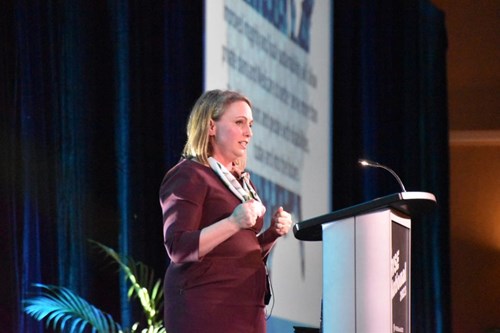Christi A. Grimm, the sixth inspector general of the U.S. Department of Health and Human Services (HHS), told RISE National attendees on Tuesday that the risk of health care fraud is real and Medicare Advantage plans must make compliance a top priority.

Grimm said the risk of fraud is due to the rapid growth in programs, and the role of the Office of Inspector General is to ensure the integrity of the programs, as well as the health and welfare of the people they serve.
The risk of fraud, waste, and abuse in Medicare Advantage by plans, providers, and vendors is significant, she said. Plans must make improving compliance a top priority.
“I’m here to underscore my commitment to ensure Medicare Advantage and plans effectively combat fraud, waste, and abuse,” Grimm said. “It’s one of my top priorities. It should be a top priority of yours as well.”
RELATED: Live from RISE National 2023: Highlights from Day One
She discussed managed care risks that the OIG has identified in their investigations. Those risks include upcoding, stinting, and misrepresentation of data that can have huge impacts, costing Medicare millions of dollars. Grimm said while risk adjustment in Medicare Advantage is important to the success of the program to treat older, sicker patients, the OIG has identified significant problems with risk adjustment.
Indeed, of the 17 HHS-OIG audits conducted since 2019, she said there was no support for nearly 69 percent of diagnoses used for risk adjustment, which led to $113 million in overpayments to plans. “Plans have a stake in the Medicare Advantage program of delivering equitable, comprehensive, and person-centered care that is sustainable and affordable. Health care abuse can jeopardize the program,” she said.
She underscored the importance of why plans should use the information provided by the OIG to look at their internal polices, procedures, and practices to identify areas for improvement. Medicare Advantage, she said, is under increased scrutiny—preparing for and embracing oversight will pay dividends.
Grimm said the OIG wants Medicare Advantage plans to be successful but its role is to ensure that the program works as intended, which means plans must ensure that enrollees receive high-quality services that are cost effective.
“Let’s start by holding wrong doers accountable,” she said, adding she is committed to take swift action against those who commit fraud. But the OIG can’t do it alone. She urged plan investigative units to identify fraud that harms enrollees and the Medicare Advantage program, and refer them to the OIG and Department of Justice. “We want to foster increased communication between plans and law enforcement in order to improve our collective enforcement ability.”
The OIG, she said, will continue to look at risk areas, such as network adequacy, benefit design, prior authorization, encounter data, and payment denials. In addition, the watchdog is currently examining Medicare Advantage efforts to reduce racial and ethnic health disparities. Investigators aim to identify actions that Medicare Advantage plans have taken to reduce these disparities as well as challenges and successes the plans have experienced.
To view Grimm's presentation at RISE National, click here.
